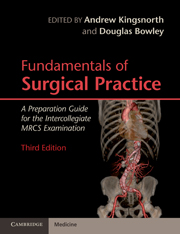Book contents
- Frontmatter
- Contents
- List of contributors
- Preface
- Section 1 Basic Sciences Relevant to Surgical Practice
- Section 2 Basic Surgical Skills
- Section 3 The Assessment and Management of the Surgical Patient
- Section 4 Perioperative Care of the Surgical Patient
- Section 5 Common Surgical Conditions
- 16 Assessment and early treatment of patients with trauma
- 17 Fundamentals of the central nervous system
- 18 Fundamentals of head and neck surgery
- 19 Fundamentals of thoracic surgery
- 20 Oesophago-gastric surgery
- 21 Fundamentals of hepatobiliary and pancreatic surgery
- 22 Fundamentals of endocrine surgery
- 23 Fundamentals of the breast
- 24 Lower gastrointestinal surgery
- 25 Fundamentals of the genitourinary system
- 26 Hernias
- 27 Fundamentals of vascular surgery
- 28 Fundamentals of orthopaedics
- 29 Fundamentals of plastic surgery
- 30 Surgical care of the paediatric patient
- 31 Fundamentals of organ transplantation
- Index
- References
31 - Fundamentals of organ transplantation
Published online by Cambridge University Press: 03 May 2011
- Frontmatter
- Contents
- List of contributors
- Preface
- Section 1 Basic Sciences Relevant to Surgical Practice
- Section 2 Basic Surgical Skills
- Section 3 The Assessment and Management of the Surgical Patient
- Section 4 Perioperative Care of the Surgical Patient
- Section 5 Common Surgical Conditions
- 16 Assessment and early treatment of patients with trauma
- 17 Fundamentals of the central nervous system
- 18 Fundamentals of head and neck surgery
- 19 Fundamentals of thoracic surgery
- 20 Oesophago-gastric surgery
- 21 Fundamentals of hepatobiliary and pancreatic surgery
- 22 Fundamentals of endocrine surgery
- 23 Fundamentals of the breast
- 24 Lower gastrointestinal surgery
- 25 Fundamentals of the genitourinary system
- 26 Hernias
- 27 Fundamentals of vascular surgery
- 28 Fundamentals of orthopaedics
- 29 Fundamentals of plastic surgery
- 30 Surgical care of the paediatric patient
- 31 Fundamentals of organ transplantation
- Index
- References
Summary
Introduction
On 3 December 1967 a patient with end-stage cardiac disease received a heart transplant from a deceased donor who had recently sustained a severe head injury. The operation took place in South Africa and the recipient lived for 3 weeks after the operation. This was not the first ‘successful’ human organ transplant – kidney transplantation was already established, but this particular event captured the public imagination worldwide.
This clinical achievement marked the turning point from organ transplantation being just a technical dream (100 years ago a French surgeon called Carrel described a technique to anastomose blood vessels), to being the treatment of choice for many types of organ failure, with demand for organs for transplantation far outstripping supply.
Transplantation is a fascinating and exciting area in which to work: the patients are often very sick, the surgery may be very technically challenging, there are many ethical issues to debate and the specialty involves a large multidisciplinary team, bringing together surgeons, physicians, radiologists, pathologists, immunologists, transplant coordinators, intensivists and pharmacists, not to mention an extremely well-informed group of patients.
Types of transplantation
Transplantation involves the transfer of part of the body to another location in the same individual, or to another individual. We tend to think of it in terms of kidney, liver and heart transplants, but its scope is much wider (Table 31.1).
- Type
- Chapter
- Information
- Fundamentals of Surgical PracticeA Preparation Guide for the Intercollegiate MRCS Examination, pp. 608 - 624Publisher: Cambridge University PressPrint publication year: 2011



